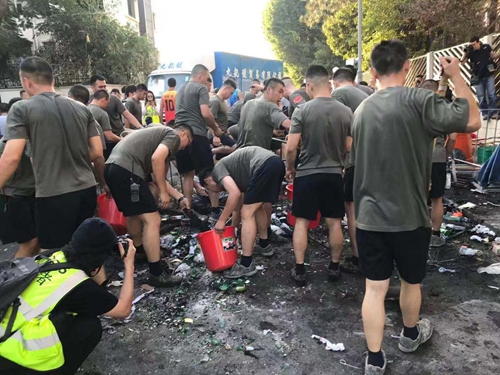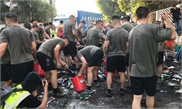
Photo: web
Unwarranted speculation spread by the Western media, which reported that soldiers of the Chinese People's Liberation Army (PLA) Hong Kong Garrison who helped remove obstacles in front of their barracks on Saturday is an intrusion of the Basic Law, is an example of the Western media's "rhetorical trap," said an analyst.
Dozens of PLA Hong Kong Garrison soldiers, who were not wearing uniforms, pitched in to clean up debris left by rioters on Renfrew Road in front of the PLA's Kowloon East Barracks. Their efforts were applauded by local residents who have endured five months of chaos that has engulfed the city. They said the help was reassuring and encouraging.
Some Western and Hong Kong media sensationalized the PLA soldiers' work and questioned its legality, alleging the move breached the Garrison Law and interfered in Hong Kong affairs.
Lawrence Ma, a Hong Kong barrister and chairman of the Hong Kong Legal Exchange Foundation, cited Article 8 of the Hong Kong Bill of Rights Ordinance regarding liberty of movement that states "everyone lawfully within Hong Kong shall have the right to liberty of movement."
The Hong Kong Bill of Rights Ordinance is Chapter 383 of the Laws of Hong Kong, which was excerpted from the International Covenant on Civil and Political Rights.
Ma noted that when PLA Garrison soldiers are not carrying out active official duties, they are ordinary residents lawfully in Hong Kong and have the same rights of movement as all other Hong Kong residents, and are protected by the Bill of Rights Ordinance.
Ma's views were echoed by Kennedy Wong Ying-ho, solicitor of the Supreme Court of Hong Kong.
"When they [the soldiers] are… not fulfilling duties, they are regulated by Hong Kong laws. If they leave the barracks, they are protected by law the same as Hong Kong citizens," said Wong, adding that out-of-uniform PLA Garrison soldiers clearing up roads on weekends cannot be considered a military action under the Garrison Law.
Sources close to the PLA told the Global Times that the clean-up efforts by the off-duty soldiers only requires permission from their immediate commander, not from officers higher up the command structure.
Not only were the soldiers out of uniform and off duty on Saturday, the barricades outside their barracks were impacting the normal activities of the soldiers, said the sources.
"The Hong Kong PLA Garrison does not want to draw extra attention [to itself] and wants to lower the sensitivity associated with their identity as part of the PLA Hong Kong Garrison," the sources said. The efforts on Saturday cannot be interpreted as any kind of hint as to what the PLA Hong Kong Garrison will or will not do next.
Wang Jiangyu, an associate professor at the Faculty of Law of National University in Singapore, told the Global Times that PLA soldiers wearing casual clothes and clearing roads near the barracks is not "interfering in Hong Kong affairs" and does not breach the law or the "one country, two systems" principle.
Wang said the move shows Hong Kong and the international community that the PLA is a positive force that engages in good deeds.
Their clean-up efforts are also in line with related laws, analysts said. They called on the PLA to take part in other activities if needed, in accordance with the laws.
Last November, Secretary for Security John Lee Ka-chiu said at a legislative council meeting that "it is not a requirement nor a restriction under the Basic Law, Garrison Law and the laws in Hong Kong for the Hong Kong Garrison to seek the approval of the HKSAR Government, notify the HKSAR Government or receive the invitation from the HKSAR Government prior to conducting any charitable activities."
He also noted that "the Hong Kong Garrison has also been conducting various charitable activities from time to time in different districts, including taking part in tree planting and blood donation events, deploying members to visit the elderly and kindergartens, as well as deploying the military band and cultural troupe to conduct voluntary performances for different organisations upon invitation."
Tian Feilong, an associate professor at Beihang University in Beijing and a member of the Beijing-based Chinese Association of Hong Kong and Macao Studies, told the Global Times that what the PLA Garrison soldiers did on Saturday was a "charitable activity" and is not considered "disaster relief" or "maintenance of public order" as detailed under Article 14 of the Basic Law.
Li Xiaobing, an expert on affairs of Hong Kong, Macao and Taiwan, from Nankai University in Tianjin, told the Global Times on Saturday that China should not be concerned by the rhetorical trap of the Western media.
"Why can't PLA soldiers clean the mess that blocked their road?" asked Li.
"It was reasonable and legal, because these roadblocks not only affected the lives of ordinary people, but also affected traffic around the military camp," he said noting that it also fully demonstrates that the officers care for the people of Hong Kong and play an active role in strengthening people's confidence in the city's future.
On Saturday night, the SAR government on behalf of the PLA Hong Kong Garrison stated, "on Saturday afternoon, some residents cleared the Renfrew Road near the PLA's Kowloon East Barracks and some PLA soldiers joined them and coordinated clearing the road in front of the barracks."
A government spokesperson also said the PLA Garrison's assistance in the clearing of road blocks was a purely voluntary community activity initiated by them and the SAR government did not request their assistance.
Weekend unrest
A police armored car was set on fire near Hung Hom around 9 pm on Sunday. A footbridge nearby was also set fire to earlier.
During a clash on Sunday afternoon near the Polytechnic University of Hong Kong, a police officer from the Force Media Liaison Cadre was shot with an arrow.
Police deployed water cannon to disperse protesters.
In the evening, the battlefield extended to the Cross-Harbour Tunnel.
The clash started in the morning when dozens of protesters threw bricks at about 100 people trying to clear barricades at the intersection of Austin Road and Chatham Road South near the Polytechnic University. The move propelled police to fire several rounds of tear gas at the protesters, who then responded by throwing bricks and Molotov cocktails.
On Saturday night, black-clad protesters near the Polytechnic University stagedconfrontation with the police. Huge fires set by protesters lit up the sky. Protesters once again set up barricades and threw Molotov cocktails, and local media reported that dangerous chemicals in several laboratories were stolen. The university has reported it to police as the university believed it may pose severe threat and harm to the public.
Despite the night-time clash, Saturday remained unusually peaceful despite occasional disputes between residents and protesters. In the afternoon, hundreds of residents came near the Hong Kong, Baptist, Chinese and Polytechnic universities to clear away bricks and other debris blocking thoroughfares.
But the clean-up was interrupted constantly with squabbles and scuffles breaking out between residents and protesters who threw burning objects at them.
Around noontime, thousands of patriotic Hongkongers gathered by the city's legislature and police headquarters, waving Chinese and Hong Kong flags, in a bid to show support to Hong Kong police and oppose anti-government violence.
The Hong Kong government announced Sunday that all schools will remain suspended on Monday due to the ongoing social unrest.
Halting the chaos
Xinwen Lianbo, the main nightly news program broadcast by China Central Television (CCTV), spent about 10 minutes on Saturday focusing on Hong Kong affairs after Chinese President Xi Jinping said on Thursday in Brazil that the most pressing task for Hong Kong at present is to bring the violence and chaos to an end and restore order.
The program showed the reactions to Xi's remarks among Hong Kong society and pro-establishment politicians, who expressed confidence that the violence and riots would be stopped after the remarks. The program also amplified opinions from scholars, journalists and diplomats across the world who agreed with Xi's judgment over the current Hong Kong situation and condemned the violent incidents in the city.
The anchors also read an editorial article published by the People's Daily and an editorial by CCTV stressing that Xi's remarks are the strongest voice from the central government on ending the violence and chaos in Hong Kong, and that the 1.4 billion people of the whole country will strongly back Hong Kong to restore social order.



